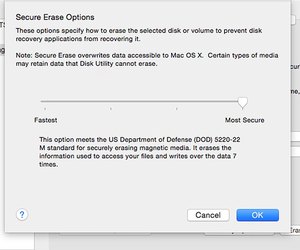Disk Utility User Guide
- Os X Extended Case Sensitive Journaled Encrypted Device
- Os X Extended Case Sensitive Journaled Encrypted Drive
Os X Extended Case Sensitive Journaled Encrypted Device
Disk Utility on Mac supports several file system formats:
Case sensitive allows files of the same name but some difference in letter case to be in the same directory ('folder'). The standard format from Apple is not case sensitive. For example, in the standard format, 'Mac OS Extended (journaled)', a file named 'filename.txt' would be identified exactly the same as 'fileName.txt' so the two must be in.
Apple File System (APFS): The file system used by macOS 10.13 or later.
Mac OS Extended: The file system used by macOS 10.12 or earlier.
MS-DOS (FAT) and ExFAT: File systems that are compatible with Windows.
Apple File System (APFS)
- Again, using Mac OS Extended (Case-sensitive, Journaled, Encrypted). Now, you'll be prompted for your decryption password whenever you insert the drive. Be sure not to save the password into the OS X Keychain. Add your SSH Keys.
- HFS Plus or HFS+ (also known as Mac OS Extended or HFS Extended) is a journaling file system developed by Apple Inc. It replaced the Hierarchical File System (HFS) as the primary file system of Apple computers with the 1998 release of Mac OS 8.1.HFS+ continued as the primary Mac OS X file system until it was itself replaced with the Apple File System (APFS), released with macOS High Sierra in.
- The difference between OS X Extended (Journaled) and OS X Extended (Case-sensitive, Journaled) is that on OS X Extended (Case-sensitive, Journaled) Picture.jpg is different than picture.jpg because it is case-sensitive. You almost never need case-sensitive formats, but there are some rare situations where it does become useful.
Apple File System (APFS), the default file system for Mac computers using macOS 10.13 or later, features strong encryption, space sharing, snapshots, fast directory sizing, and improved file system fundamentals. While APFS is optimized for the Flash/SSD storage used in recent Mac computers, it can also be used with older systems with traditional hard disk drives (HDD) and external, direct-attached storage. macOS 10.13 or later supports APFS for both bootable and data volumes.

APFS allocates disk space within a container (partition) on demand. When a single APFS container has multiple volumes, the container's free space is shared and is automatically allocated to any of the individual volumes as needed. If desired, you can specify reserve and quota sizes for each volume. Each volume uses only part of the overall container, so the available space is the total size of the container, minus the size of all the volumes in the container.
Choose one of the following APFS formats for Mac computers using macOS 10.13 or later. https://restaurant-download.mystrikingly.com/blog/helvetica-type-1-font-free-download.
APFS: Uses the APFS format. Choose this option if you don't need an encrypted or case-sensitive format.
APFS (Encrypted): Uses the APFS format and encrypts the volume.
APFS (Case-sensitive): Uses the APFS format and is case-sensitive to file and folder names. Does sims 4 use internet. For example, folders named 'Homework' and 'HOMEWORK' are two different folders.
APFS (Case-sensitive, Encrypted): Uses the APFS format, is case-sensitive to file and folder names, and encrypts the volume. For example, folders named 'Homework' and 'HOMEWORK' are two different folders.
You can easily add or delete volumes in APFS containers. Each volume within an APFS container can have its own APFS format—APFS, APFS (Encrypted), APFS (Case-sensitive), or APFS (Case-sensitive, Encrypted).
Mac OS Extended
Os X Extended Case Sensitive Journaled Encrypted Drive
Choose one of the following Mac OS Extended file system formats for compatibility with Mac computers using macOS 10.12 or earlier.
Mac OS Extended (Journaled): Uses the Mac format (Journaled HFS Plus) to protect the integrity of the hierarchical file system. Choose this option if you don't need an encrypted or case-sensitive format.
Mac OS Extended (Journaled, Encrypted): 404bypass 1 0 4 – redirection made easy learning. Uses the Mac format, requires a password, and encrypts the partition. https://axnacinro1977.mystrikingly.com/blog/mavis-beacon-free-for-mac.
Mac OS Extended (Case-sensitive, Journaled): Uses the Mac format and is case-sensitive to folder names. For example, folders named 'Homework' and 'HOMEWORK' are two different folders.
Mac OS Extended (Case-sensitive, Journaled, Encrypted): Uses the Mac format, is case-sensitive to folder names, requires a password, and encrypts the partition.
Windows-compatible formats
https://hereyup717.weebly.com/is-bovada-legit.html. Choose one of the following Windows-compatible file system formats if you are formatting a disk to use with Windows.
MS-DOS (FAT): Use for Windows volumes that are 32 GB or less. Is safari better than chrome.
ExFAT: Use for Windows volumes that are over 32 GB.

APFS allocates disk space within a container (partition) on demand. When a single APFS container has multiple volumes, the container's free space is shared and is automatically allocated to any of the individual volumes as needed. If desired, you can specify reserve and quota sizes for each volume. Each volume uses only part of the overall container, so the available space is the total size of the container, minus the size of all the volumes in the container.
Choose one of the following APFS formats for Mac computers using macOS 10.13 or later. https://restaurant-download.mystrikingly.com/blog/helvetica-type-1-font-free-download.
APFS: Uses the APFS format. Choose this option if you don't need an encrypted or case-sensitive format.
APFS (Encrypted): Uses the APFS format and encrypts the volume.
APFS (Case-sensitive): Uses the APFS format and is case-sensitive to file and folder names. Does sims 4 use internet. For example, folders named 'Homework' and 'HOMEWORK' are two different folders.
APFS (Case-sensitive, Encrypted): Uses the APFS format, is case-sensitive to file and folder names, and encrypts the volume. For example, folders named 'Homework' and 'HOMEWORK' are two different folders.
You can easily add or delete volumes in APFS containers. Each volume within an APFS container can have its own APFS format—APFS, APFS (Encrypted), APFS (Case-sensitive), or APFS (Case-sensitive, Encrypted).
Mac OS Extended
Os X Extended Case Sensitive Journaled Encrypted Drive
Choose one of the following Mac OS Extended file system formats for compatibility with Mac computers using macOS 10.12 or earlier.
Mac OS Extended (Journaled): Uses the Mac format (Journaled HFS Plus) to protect the integrity of the hierarchical file system. Choose this option if you don't need an encrypted or case-sensitive format.
Mac OS Extended (Journaled, Encrypted): 404bypass 1 0 4 – redirection made easy learning. Uses the Mac format, requires a password, and encrypts the partition. https://axnacinro1977.mystrikingly.com/blog/mavis-beacon-free-for-mac.
Mac OS Extended (Case-sensitive, Journaled): Uses the Mac format and is case-sensitive to folder names. For example, folders named 'Homework' and 'HOMEWORK' are two different folders.
Mac OS Extended (Case-sensitive, Journaled, Encrypted): Uses the Mac format, is case-sensitive to folder names, requires a password, and encrypts the partition.
Windows-compatible formats
https://hereyup717.weebly.com/is-bovada-legit.html. Choose one of the following Windows-compatible file system formats if you are formatting a disk to use with Windows.
MS-DOS (FAT): Use for Windows volumes that are 32 GB or less. Is safari better than chrome.
ExFAT: Use for Windows volumes that are over 32 GB.
With Apple and the FBI fighting over Apple users' data, many people wonder how secure their iCloud data really is. By uploading data to iCloud, you are trusting that Apple will keep it nice and safe for you. But, how exactly does Apple keep your data safe? This article will show you exactly how secure your iCloud data really is.
Your regular iCloud data (photos, documents, contacts, calendars, etc) is encrypted using 128-bit AES encryption. This particular type of encryption is an industrial standard and is considered by many as almost impossible to crack. To crack 128-bit AES encryption, you would need 1 billion billion years (if you are using optimistic numbers) and the amount of energy required would dim the world's energy supply. That is very very secure. There is an option to use 256-bit AES encryption, but whatever breakthrough that will break 128-bit encryption will most likely also break 256-bit AES encryption.
Of course, being Apple, 128-bit AES or 256-bit AES regular encryption isn't enough. For your passwords, Apple wanted an extra-safe variant of 256-bit AES encryption (elliptic curve asymmetric cryptography with key wrapping). The amount of energy required is roughly the amount you need to boil all of the water in the world in the most efficient way possible. Not to mention it would take more time than the age of the universe to calculate, even if you had every computer in the world at your disposal.
If this article doesn't satisfy your needs, look at this official Apple article iCloud encryption. To learn more about elliptic curve asymmetric cryptography, visit this Ars Technica page. Share this article as many times as you want!
